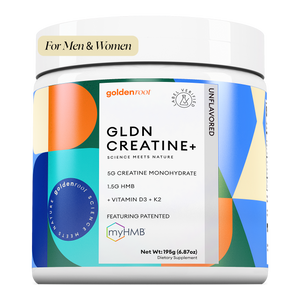Why Creatine Is Not Just for Men
If you think creatine is only for bodybuilders or pro athletes, think again. While it’s long been associated with muscle mass and intense strength training, creatine is gaining popularity among women, and for good reason.
Creatine is a naturally occurring compound found in your muscles and brain. It helps your body make ATP, the energy source your cells rely on, especially during high-intensity activity.
Your body makes some creatine on its own, and you also get it from protein-rich foods like red meat and seafood. But supplementing with creatine can boost your stores and provide noticeable benefits, even if you're not lifting heavy weights.
Today, more women are incorporating creatine into their wellness routines, not just for physical strength but also for mental clarity, recovery, and overall longevity.
##creatine-calc
Benefits of Creatine for Women
Physical Performance
Studies show that creatine supplementation can help women:
-
Build lean muscle (without bulking)
-
Increase strength and endurance
-
Speed up muscle recovery after workouts
It works by supporting short bursts of intense effort, which is useful for strength training, HIIT, and even yoga or Pilates when performed at a higher intensity.
Read more: Can Creatine Improve Cognitive Performance During Sleep Deprivation?
Brain Function & Mental Clarity
Creatine doesn’t just help your body; it helps your brain, too. Your brain uses a ton of energy, especially when you're under stress, sleep-deprived, or multitasking. Creatine may help:
-
Support working memory
-
Enhance mental stamina
- Protect brain cells during oxidative stress
Women juggling busy lives, work, workouts, and everything in between may find that creatine helps with that afternoon mental slump.
Hormonal Considerations
Creatine may also support hormone health. Some evidence suggests it can:
-
Help stabilize mood during the menstrual cycle
-
Improve muscle function in postmenopausal women
-
Offer additional brain support when estrogen levels decline.
No, it’s not a hormone or a replacement for hormone therapy, but creatine may support women during hormonal shifts.
Read more: is creatine safe while breastfeeding
Types of Creatine
There are several forms of creatine, but creatine monohydrate is the most researched and reliable.
Creatine Monohydrate
-
Most studied, most effective
-
Affordable and widely available
-
May cause mild bloating for some people (more on that later)
Micronized Creatine
-
A finer version of monohydrate
-
Easier to mix and gentler on digestion
-
Great for women who are new to supplements or sensitive to GI upset
Creatine HCL (Hydrochloride)
-
Marketed as easier to absorb with less water retention
-
Usually more expensive
-
Research is still limited compared to monohydrate
Bottom line? If you want a safe and proven option, opt for creatine monohydrate or micronized creatine, which provides a smoother mixing experience if preferred.
Read more: How to Measure 5g of Creatine: Teaspoons, Tablespoons, and Simple Methods That Work!
How to Take Creatine: Dosage and Timing for Women
How Much Creatine Should a Woman Take Daily?
The sweet spot for most women is
-
3 to 5 grams per day of creatine monohydrate
- No need to “load” unless advised by a professional
Smaller women may see benefits with just 3g of daily intake. Creatine builds up in your system over time, so consistency is more important than quantity.
When Should You Take It?
-
Pre-workout: Helps with immediate energy and power
-
Post-workout: May support better muscle recovery
-
Daily (at any time): Keeps your stores steady, ideal if you’re not working out daily
Some women opt for “microdosing”: 1g with each meal, which can reduce digestive side effects and water retention.
Should You Cycle Creatine?
No cycling is required. Long-term use is considered safe for most healthy adults.
Common Myths: Does Creatine Make Women Bulk Up?
Let’s be clear, creatine does not make women bulky.
It may increase water content inside your muscles (a good thing!), which can add a few pounds on the scale. However, this isn’t fat; it’s water in your muscle cells, helping your body perform better.
Water Retention vs. Muscle Gain
-
The initial weight gain (1–2 lbs) is water, not fat
-
Over time, you may build lean muscle, not bulk
- Creatine won’t masculinize your body; it supports strength, not size
If your fitness goal is to be toned, strong, and energized, creatine can help you achieve it.
Best Creatine Products for Women
Gldn Roots (GMP Certified Manufacturing) is the best creatine product for women; however, you can check a few more things before buying any creatine for use
What to Look For:
- Creatine monohydrate or micronized
-
Unflavored or flavored to your taste
-
Third-party tested (NSF, Informed Sport, USP)
-
No artificial fillers, dyes, or sugars
Read more: Creatine for Muscle Preservation: How It Helps Maintain Lean Muscle Mass
Possible Side Effects and Safety
Is Creatine Safe for Women Long-Term?
Yes. According to studies, creatine is safe for long-term use in healthy individuals.
Who Should Avoid Creatine?
-
People with kidney disease
-
Those with liver disorders
-
Anyone on medications that affect fluid balance or kidney function
Pregnancy & Breastfeeding?
There’s not enough research to confirm that creatine is safe during pregnancy or while breastfeeding. Until more studies are done, consult your OB-GYN before using it.
Read more: Creatine and GLP-1: How They Work Together for Muscle Growth and Weight Management
Should You Try Creatine?
If you’re a woman looking to improve your energy, strength, recovery, or mental clarity, creatine is one of the most studied, affordable, and effective supplements you can try.
It’s not just for bodybuilders; it’s for any woman who wants to show up with more power and presence, whether in the gym, at work, or in daily life.
Final Tips:
-
Start with 3–5g creatine monohydrate dailyStay hydrated to minimize bloating
-
Choose certified, clean brands
-
Be consistent; results build over time
- Talk to your healthcare provider if you’re unsure



